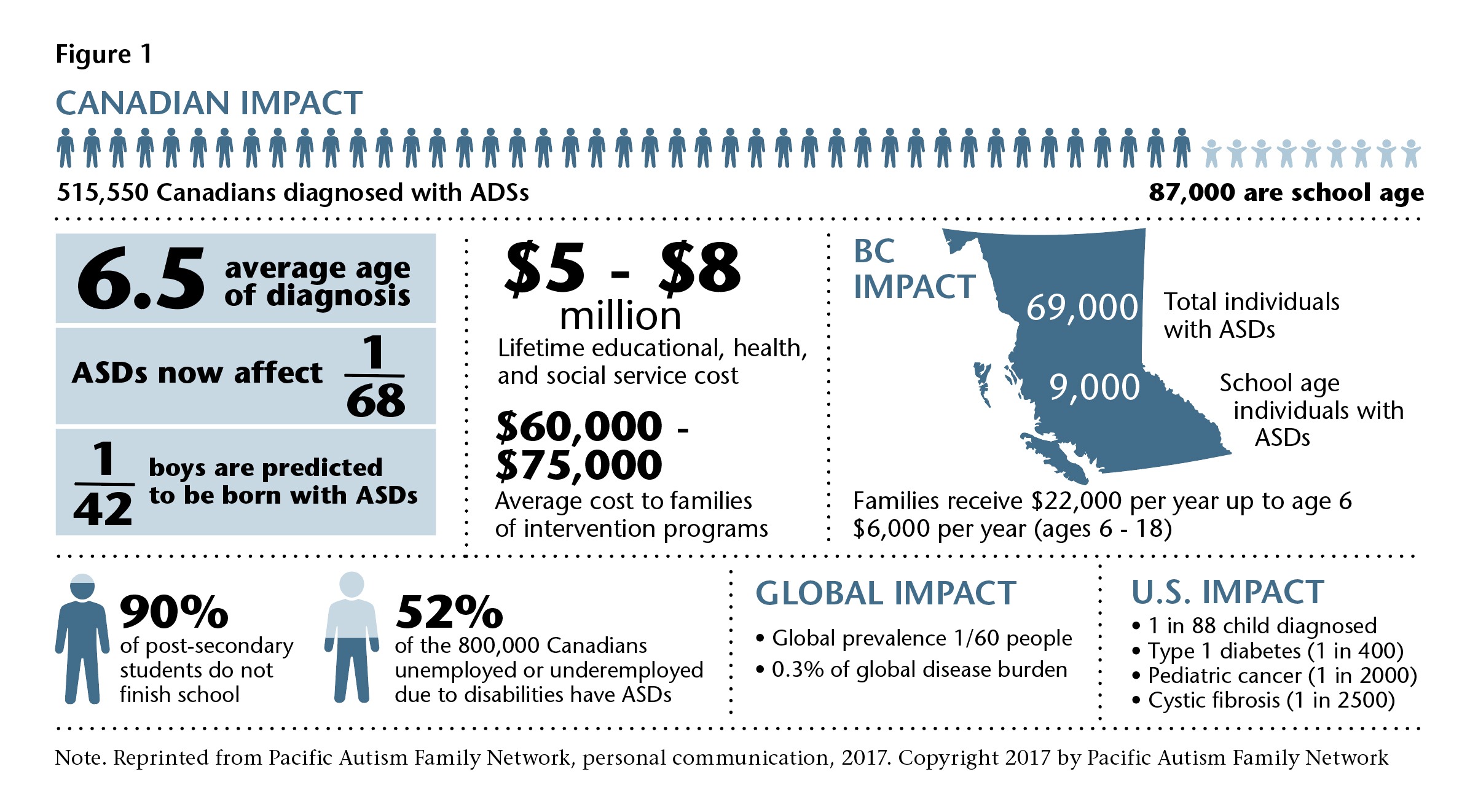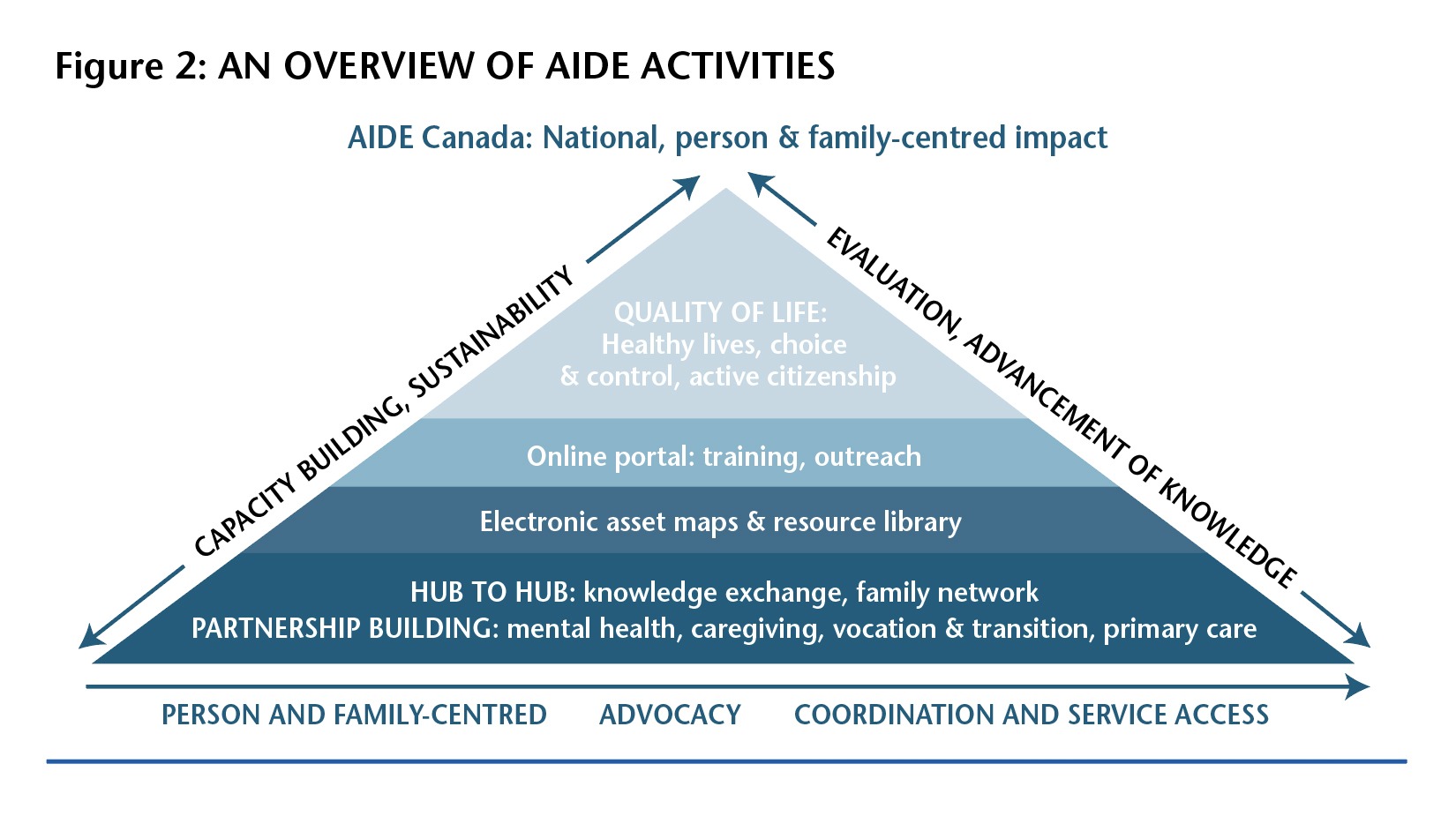Knowledge is Power: New Hope for Autistic Canadians and Their Families
Margaret Clarke
Any parent who has navigated the reality of an autism diagnosis with their child knows that two necessities suddenly take on disproportionate urgency in their lives: time and information. In its 2018 budget, the Trudeau government included $10.9 million to establish the Autism-Intellectual Disability National Resource Library and Exchange Network (AIDE). It will, among other outcomes, expedite and centralize access to the latest information available on every aspect of living with autism.
Canadians with autism and intellectual disabilities and their families continue to confront systemic barriers and regional fragmentation in their pursuit of information, care and resources. There is a pressing need today for these Canadians to have accessible, unbiased and credible information—a need for a knowledge exchange and for effective communication of key information, including the best research evidence in areas that matter to individuals and their families. In fact, the 2007 Senate report “Pay Now or Pay Later: Autism Families in Crisis” called for precisely such reforms (Standing Senate Committee on Social Affairs, Science and Technology, 2007).
Canada’s autism treatment regime is rife with systematic barriers and regional fragmentation, preventing families from accessing the information, care and resources required to obtain and navigate a diagnosis that identifies a developmental disability. Unfortunately, this gap too often imposes lifelong challenges that can result in emotional, social and economic strains on families. Recent Canadian reports indicate access to information is top of mind for individuals with autism and their families, with 74 per cent ranking better access to information as a top priority (Pacific Autism Family Network & Miriam Foundation, 2018).
Further, Canadians impacted by autism and intellectual disabilities face the unique challenge of navigating complex interdisciplinary and multijurisdictional environments in their search for needed resources and supports. Much of the information that can help support interventions, foster independence and place and keep Canadians in the workplace, are not readily available. Furthermore, resources and supports vary across regions, which further renders this search confusing and difficult (Weiss, Whelan, McMorris, Carroll, & the Canadian Autism Spectrum Disorders Alliance, 2014).
The case for high-quality, connected and accessible information and support is compelling—across a number of lifelong conditions including autism and other developmental disabilities. In parallel areas such as chronic illness, positive impacts on service use and costs, reduction in family stress and increased self- management have all been documented (Patient Information Forum, 2013).
In looking beyond our borders, Canadians remain under-served to date relative to some other jurisdictions. The United Kingdom (e.g., England [Social Care, Local Government and Care Partnership Directorate, Department of Health, 2014]), as an example, adopted comprehensive, national autism strategies where information exchange is a core pillar. Few, however, have developed “joined up” thinking between autism and intellectual disabilities. There is a need for innovative approaches to integrating access to information for families.
The impacts of autism and intellectual disability vary, but are generally viewed as profound. As an example in autism (see Figure 1), the Public Health Agency of Canada’s (2018) National Autism Spectrum Disorder (ASD) Surveillance System (NASS) indicates that among children and youth 5-17 years old across six provinces and one territory, the combined prevalence of ASD in 2015 was 1 in 66 (15.2 per 1,000). Of note, males were diagnosed with ASD four times more frequently than females, and 1 in 42 males (23.9 per 1,000) and 1 in 165 females (6.0 per 1,000) aged 5-17 years were diagnosed with ASD. Retrospective data from 2003-015 from Newfoundland and Labrador, Prince Edward Island and Quebec showed that, among 5-14 year olds, ASD prevalence has increased from 6.0 per 1,000 to 19.6 per 1,000 in Newfoundland and Labrador; from 5.0 per 1,000 to 17.7 per 1,000 in Prince Edward Island; and from 3.5 per 1,000 to 15.7 per 1,000 in Quebec (Public Health Agency of Canada, 2018).
 In February, the movement to assist Canadians living with autism, intellectual and development disabilities and their families gained ground when the Government of Canada (2018) announced an investment of $20 million over five years as part of the federal budget.
In February, the movement to assist Canadians living with autism, intellectual and development disabilities and their families gained ground when the Government of Canada (2018) announced an investment of $20 million over five years as part of the federal budget.
The funding will be used to develop new initiatives to support the needs of Canadians experiencing these conditions and their families. This will include $10.9 million toward the creation of an Autism-Intellectual Disability National Resource Library and Exchange Network (AIDE) which will provide credible and evidence-based resources for individuals and families living with autism and intellectual disabilities. AIDE will be led by Pacific Family Autism Network and Miriam Foundation, with the following key aims:
1. Coordination and leveraging of existing resources (private and public) to maximize effectiveness, with new resources being built only as needed.
2. Extensive knowledge sharing to maximize services and supports based on rapid dissemination of demonstrated solutions.
3. Promotion of evidence-informed practice via a robust, accessible and tailored electronic platform.
4. Collaborative reach of the Exchange to a large network of Canadian organizations; this will leverage current resources for greater information sharing and access.
5. Support for innovation, ingenuity and capacity of individuals with disabilities and their families.
In order to ensure access to information for Canadians across the country, AIDE will offer a centralized website, an app for mobile devices, a toll-free telephone service, electronic asset maps and more. AIDE will also be the catalyst for the creation of a hub-to-hub network of organizations in linking service access, including connection for families across the country. It will build on resources and evidence-informed practices throughout the country so that all Canadians may benefit in real time, and is based on the principles of “intervene early, intervene often and intervene across the lifespan” (Pacific Autism Family Network & Miriam Foundation, 2018). It is well known that a comprehensive system of information and care for chronic conditions requires many accessible doorways that are not dependent on entering the medical system or the pay-for-service model (Patient Information Forum, 2013).
Customized technology will be designed for AIDE, including an online interface and a back-end database, both of which can be regularly and rapidly updated to ensure optimal currency. The Pacific Autism Family Network has invested nearly a decade in the development of a provincial network that can be scaled up across Canada.
Figure 2 outlines the opportunities and range of work of AIDE over the next five years. This initiative will be primarily guided by the needs of individuals and families. A robust information sharing network based on identified needs and the presence of “joined up” thinking and practice is at the heart of this initiative. Measurement of outcomes and impacts will reflect careful attention to ensure continuous quality improvement. Keeping the key components of AIDE firmly embedded in these principles will serve to build and sustain this innovation.
 The value of this multifaceted knowledge exchange model is substantial given how information can positively impact well-being and quality of life (Patient Information Forum, 2013). Moreover, the integrated information-based approach inherent in this initiative promises widespread reach and impact on Canadians living with autism and intellectual disabilities. It is anticipated that AIDE will have a significant impact at many levels, including economic impact through increased employment and enhanced opportunity for individuals and families to participate actively in society, reducing caregiver stress and transferring essential knowledge to families. Adequate support enhances outcomes, including coping and stress reduction. As an example, it is anticipated that supporting parents with greater skills to help their children learn and develop to their potential will yield improvement in child outcomes and parent well-being. Examples of key gains expected from AIDE are:
The value of this multifaceted knowledge exchange model is substantial given how information can positively impact well-being and quality of life (Patient Information Forum, 2013). Moreover, the integrated information-based approach inherent in this initiative promises widespread reach and impact on Canadians living with autism and intellectual disabilities. It is anticipated that AIDE will have a significant impact at many levels, including economic impact through increased employment and enhanced opportunity for individuals and families to participate actively in society, reducing caregiver stress and transferring essential knowledge to families. Adequate support enhances outcomes, including coping and stress reduction. As an example, it is anticipated that supporting parents with greater skills to help their children learn and develop to their potential will yield improvement in child outcomes and parent well-being. Examples of key gains expected from AIDE are:
• Decreased caregiver stress that currently limits participation in the workforce and heightens risk for chronic disease and family discord.
• Increased capacity of families to support one other.
• Enhanced resources and accessibility of resources to enable those with primary caregiving responsibilities to receive timely information and support.
• Improved labour market involvement including higher incomes among persons with disabilities and their caregivers.
Building on the substantial advances made by the federal government in the last decade in support of people with disabilities, AIDE will nurture long-term well-being. This social innovation will profoundly improve quality of life for Canadian individuals and families, with implications across disabilities. The potential population benefit of this initiative is exponential. The approach and strategies developed can be readily scaled up to other disability populations, potentially further resulting in beneficial impacts for Canadians.
Contributing Writer Margaret Clarke is a Professor of Medicine and Fellow of the School of Public Policy at the University of Calgary. mdclarke@shaw.ca
Project leads: Sergio Cocchia, Pacific Autism Family Network and Warren Greenstone, Miriam Foundation.
SaveSave
SaveSave
